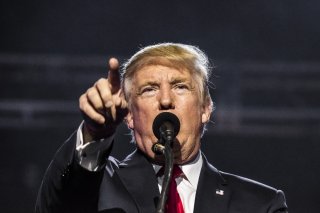The Trump-Russia Problem Remains
Moscow’s recent counter-sanctioning of American officials includes figures who have nothing to do with Russia policy… but do happen to be political enemies of former President Donald Trump.
Once in office, Trump provided additional reason for suspicion about the nature of his relationship with Moscow, with perhaps the most suspicious thing being how he choreographed his meetings with Russian president Vladimir Putin. In a highly unusual way of handling such meetings, Trump shut out his own staff and officials with responsibilities involving relations with Russia, not even giving them an after-the-fact debrief. After his first meeting with Putin, Trump confiscated his interpreter’s notes and ordered him not to disclose to anyone what he had heard. In other conversations with the Russian president, he used Putin’s interpreter, with no Americans present besides Trump himself. To this day, we do not know what they discussed.
Trump said and did a number of things favorable to the Russian regime while he was in office, including publicly siding with Putin rather than U.S. intelligence agencies when the Russian president falsely denied interfering in U.S. elections. Such sayings and doings represent part of the payoff that Russia has gotten for its investment in Trump. Another big part of the payoff is the exacerbation of political division in the United States and discrediting of American democracy that Trump has done so much to foment. Most or maybe all of this was part of the approach Trump would have taken anyway in his bid for power, but it is a consequence that is in Russia’s interest and very much against U.S. interests.
Trump’s advocacy on behalf of the Russian regime has continued while out of office. Two days before the start of Russia’s brutal war in Ukraine, Trump was calling Putin a “genius” and lauding him for his “smart move” in deploying a “peace force” to the border with Ukraine. Such talk is not explainable in terms of any U.S. grand strategy, Republican foreign policy ideology, or even the culture-war-driven sympathy that some on the American Right have shown for Putin’s anti-woke themes. It becomes explainable only by postulating that there is even more to the relationship between Trump and Russia than has yet come to light.
Today, Donald Trump is the front-runner for the Republican presidential nomination in 2024. Some polls show him going on to win the general election. If he does, Russia may again have an asset in the Oval Office. Because of what is still unknown, the exact nature of the Trump-Russia relationship could be anywhere along a spectrum of the sorts of relations that a foreign power can have with an asset in the United States. On one end of the spectrum is the useful fool, who is not consciously doing a foreign regime’s bidding but acts for his own reasons in that regime’s interests. On the other end is a Russian version of a Manchurian Candidate.
It is inexcusable, in the face of what may be one of the most serious cases ever of malign influence by a foreign power at high levels of the U.S. government, for politicians and commentators acting out of partisan motives—or even the ostensibly noble motive of minimizing U.S.-Russian tensions—to discourage the vigorous investigation that is needed to fill the remaining gaps in this disturbing story.
Paul Pillar retired in 2005 from a twenty-eight-year career in the U.S. intelligence community, in which his last position was as a National Intelligence Officer for the Near East and South Asia. Earlier he served in a variety of analytical and managerial positions, including as chief of analytic units at the CIA covering portions of the Near East, the Persian Gulf, and South Asia. Professor Pillar also served in the National Intelligence Council as one of the original members of its Analytic Group. He is also a contributing editor for this publication.
Image: Shutterstock.

